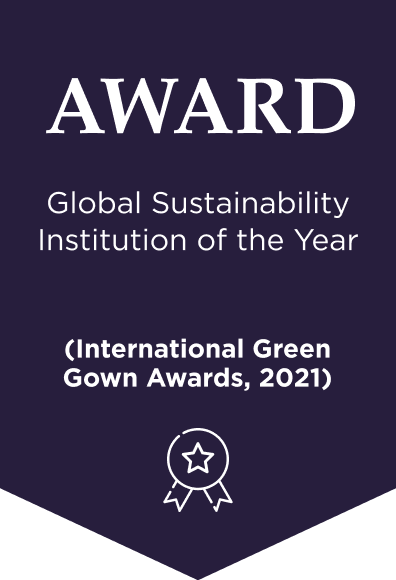Green technology: protecting and preserving our planet
Posted on: February 13, 2023
It’s not news to anyone that the health and future of our planet – and, as a result, our global population – is on the brink of crisis.
Issues of climate change, environmental impact and sustainability have never been as prominent in the lives of consumers and businesses alike. While many of us are aware of the role human activity plays – understanding the need to make changes on an individual-level, from reducing our carbon footprint to recycling more – change on a far-greater scale is required if seismic shifts are to occur.
The world of industry must drastically alter its course if we are to avoid further catastrophic effects such as global warming, biodiversity loss, depletion of natural resources, species extinction, natural disasters and pollution.
For business leaders, keen awareness of industry developments, technological advances, environmental, social and governance (ESG) initiatives and green innovations can help to move the needle in designing and building a greener future.
What is green technology?
Leading carbon accounting and management platform, Greenly, define green technology as any technology that is designed to reduce the negative impact of human activity on the environment.
Green tech, also referred to as environmental tech, focuses on developing innovative solutions to critical issues such as climate change reversal, pollution reduction and energy production. It is often split into two main categories:
- Clean technology, or clean tech, refers to a wide-ranging field of solutions that seek to improve production-related performance, productivity and efficiency, while also minimising human-induced, negative environmental impacts. Sectors within clean tech include waste management and recycling, clean water, clean energy, pollution and air quality.
- Climate technology, or climate tech, refers to solutions that specifically tackle issues related to human-induced climate change by reducing or mitigating greenhouse gas emissions. This may involve reducing greenhouse gases currently being produced, removing or capturing those already in our atmosphere, and reducing future carbon emissions. Sectors within climate tech include afforestation, geo-engineering, carbon capture and agricultural technology (AgTech).
Beyond the positive action it means for our planet, businesses across the world have the opportunity to benefit considerably from adopting green tech and embedding sustainable practices. As well as boosting environmental image – a huge draw for customers – it helps to build resilience into the supply chain, strengthen the future outlook of the business, and meet strict product or industry specifications and regulatory controls.
The sectors of green technology
The United Nations Environment Programme (2003) discusses the main roles that production and consumption technologies fulfil – and that green tech is concerned with developing solutions for:
- Monitoring and assessment – the measuring and tracking of environmental conditions.
- Prevention and control – the production of environmentally hazardous substances, altering human activities in ways that minimise environmental damage, substituting products or redesigning production processes, and rendering hazardous substances harmless before they enter the environment.
- Remediation and restoration – the utilisation of methods that are designed to improve the health of ecosystems.
These technologies have application across key sectors of development, infrastructure and industry. Here are some examples:
- Agriculture. Making farming more sustainable via methods such as vertical farming, zero tillage, organic farming, irrigation, digital sensing, fleet management, biotechnology and integrated pest management.
- Energy. Developing fossil fuel alternatives to find more sustainable, efficient ways of producing renewable energy. For example, solar power, nuclear power, wind power, biogas, biomass, geothermal, and low-impact hydro-electric power.
- Water and waste management. Encouraging resource efficiency through recycling, upcycling and composting, as well as developing technologies – for example, the use of bioreactors and bio filtration for more-efficient sewage treatment.
- Built environment. Designing and creating environmentally friendly buildings and structures, considering factors such as building materials, land use and choice of land, and using green energy and energy-efficient methods.
- Transportation. Balancing our current and future transport needs via methods such as developing electric vehicles, focusing on the decarbonisation of vehicles, using autonomous vehicles for logistics, using technology to route-find, and developing green highways.
Other sectors include green nanotechnology, environmentally preferred purchasing, and green chemistry, among others. While some initiatives will pursue a single issue within one of these categories, there are plenty that overlap, adopting an interdisciplinary approach that achieves positive benefits across multiple issues.
The challenges of adopting green tech practices
Green tech accounts for its environmental costs – i.e. costs that are typically externalised in more-traditional production processes. The associated expense of switching to green tech, therefore, tends to be greater than for the tech it aims to replace. Additionally, new tech brings with it development and training costs – requiring both time and money from the businesses switching to greener practices.
Business leaders also have decisions to make related to a number of practical concerns regarding: technological readiness; infrastructure; employee capabilities; regulatory frameworks; the geography of operations; and a host of other cultural, legal, financial or political constraints. These factors will impact which regions or countries are ready to adopt green tech and those for which it may be currently unfeasible. Companies may also encounter uncertainties regarding the overall performance of newer, greener methods.
Encouraging sustainable switches, particularly when they affect established business models and ways of working, are often complex and hard-won. Depending on the situation, governments, NGOs, private sector companies and a host of other parties and stakeholders may be involved. Special attention must be paid to countries – such as developing countries and small island states – who are likely to face greater barriers to access. If this is not addressed, large-scale dissemination of green technologies will fail.
Developments in the green technology sector
The green tech sector is booming. Between 2021 and 2030, Statista estimate that the global green technology and sustainability market is forecast to grow from 35.5 billion euros to 417.35 billion US dollars – a compound annual growth rate of 21.6%.
A number of trends across the green tech sector are steadily gaining momentum. Tech companies around the world are working on developing sustainable solutions, including:
- low-carbon construction
- carbon capture and carbon storage
- renewable energy storage
- hydrogen
- circular waste management
- artificial intelligence and machine learning
- blockchain.
Play your part in the green technology revolution
Keen to encourage ESG-led change in your industry? Interested in how sustainable development could positively impact your business?
Develop the skills and expertise to build a more sustainable future with Keele University’s online MSc Management with Sustainability programme.
Combining core management and specialist sustainability-focused modules, our flexible course is designed to help you succeed in senior leadership positions in fast-paced, challenging industries while protecting our natural environment. Through your studies, you’ll gain the know-how to change policies and practices, championing sustainable business and shaping our world for the better. From operations and supply chain management to green finance and people management – plus much more – join us, and prepare to take the next step in your career.



